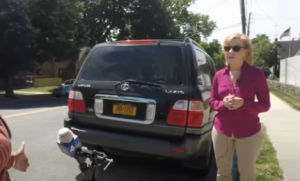In an incident on Staten Island, a family claims their car was seized by officers from the New York Police Department (NYPD) without proper paperwork or explanation. The event has raised concerns about potential racial profiling, as the family believes the seizure was unjust and racially motivated. Jolin Albus, the mother of Nick Adenikan, captured the entire incident on video, believing that without the footage, their story would be dismissed.

Incident Details
The ordeal began when Nick Adenikan, a college student, parked his black Mercedes in the Great Kills neighborhood of Staten Island. Adenikan, who had returned home for the weekend, left the car momentarily to search for a friend in the area. Upon returning to his vehicle, he found it surrounded by officers from the NYPD’s 122nd precinct. According to Adenikan, the officers did not ask to see his license or vehicle registration before ordering that his car be towed. A female officer told him he could not access his car, stating that he was not the registered owner. The vehicle, however, was registered to Adenikan’s mother, Jolin Albus.
When Adenikan questioned why the car was being towed, the officer provided little information, stating only that it was part of an ongoing investigation involving “guns, drugs, and a stabbing.” Despite this explanation, neither Adenikan nor his mother was provided with any official documentation or paperwork about the seizure. Adenikan, frustrated and confused, called his mother, who immediately arrived on the scene.
Lack of Communication and Paperwork
Jolin Albus, upon arriving at the scene, also attempted to get answers from the officers about why her son’s car was being taken. According to Albus, the officers refused to offer any specific explanation, only repeating that the car was part of an investigation. Albus insists that neither she nor her son were involved in any criminal activity and that the vague accusations provided by the police were entirely unfounded.
The family followed the car to the 122nd precinct, where they waited for hours, determined to retrieve their vehicle. Eventually, a detective led them to the Mercedes, but the family was shocked to find that the car had been damaged. Video footage taken by the family shows that the front of the car had been scraped against the pavement during the towing process, causing significant damage. Additionally, the car appeared to have been searched by officers, as personal belongings inside had been moved around. Adenikan noted that he never gave anyone the keys to the vehicle, suggesting that officers entered the car without permission.
Filing a Complaint
After the car was returned, Albus repeatedly visited the 122nd precinct over the following days, attempting to obtain paperwork or a report documenting the seizure of the vehicle. She claims that each time, she was met with resistance from the officers. Albus recorded her conversations with police personnel, who informed her that there were no vouchers, tow papers, or any other official documentation regarding the incident. Despite the family’s persistent efforts to obtain an explanation or documentation, the precinct has yet to provide any formal paperwork.
In response to the incident, the family has filed a complaint with NYPD’s Internal Affairs Bureau. They believe that the seizure of their car and the subsequent treatment by the officers were racially motivated. Albus emphasized that she does not want financial compensation but is demanding an apology from the police department. She asserts that her son was unfairly targeted because he is a young Black man driving an expensive car in a predominantly white neighborhood. According to the family, this is exactly the type of behavior that has led to widespread protests against racial profiling and police misconduct across the country.
Ongoing Investigation
The NYPD has confirmed that there is an active internal investigation into the incident. However, the department has not provided further details about the investigation or the reasons for the seizure of the vehicle. Albus and her family remain determined to hold the police department accountable for the damage to their car and the way they were treated.
The incident has sparked conversations about racial profiling and police accountability, especially in light of recent protests against police misconduct in New York and across the United States. For the Adenikan family, the ordeal has left lasting emotional scars, but they are committed to seeking justice and ensuring that their story is heard.
Conclusion
The seizure of the Adenikan family’s car by the NYPD, without explanation or paperwork, has raised serious concerns about racial profiling and police accountability. The family believes that their treatment was racially motivated and is determined to hold the police responsible for their actions. The NYPD has launched an internal investigation, but the family continues to seek answers, justice, and an apology. The incident serves as a reminder of the ongoing tensions between law enforcement and communities of color, as well as the need for greater transparency and accountability within the police force.


